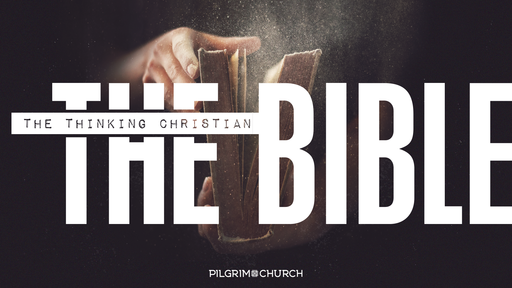November 4, 2018 - The Thinking Christian #4 - The Bible
Notes
Transcript
November 4th, 2018
The smaller groups in our church community are inside our homes where we go deeper,
build friendships, and walk out the Christian life with each other.
HOME CHURCH/SMALL GROUP/CLASS GUIDE
1. “Breaking the Ice” question: (group facilitator)
2. Check-ins: What’s been happening in your week(s) since last meeting? Introduce yourself if new/new
people in group, check in with each other
3. Care: Needs in the group; name needs and have sentence prayers (short sentences/open ended, not
long-winded) at end of the gathering time
4. Compassion: What compassion work is the group planning? Are you inviting your neighbors to join?
5. Group Announcements (church-wide and group-only)
6. Dig in: Any reflections, discernments, disagreements from last week’s teaching (or since you last
met)? Look at the Bible passage(s) again and read some of them out loud in the group (and other verses
that may have been mentioned). What jumps out at you? Discuss some of the questions as a group.
7. End and Homework: Final questions, prayer huddles for personal requests. Consider breaking into
small groups (huddles) of 2-4, by gender, if large enough.
DISCUSSION:
1. How do you see the Old Testament? What do you know about it?
2. What do you think about the language: Old Testament, Old Covenant, Hebrew Bible?
What Does a Christian Do with the Old Testament?
We Value Biblical Truth - An Overview of Understanding the Old Testament
KEY VERSES:
1 Corinthians 3:11
2 Timothy 3:16
MAIN IDEA: It’s a Road Map (travel guide), a revelation of relationship, not a
magic book of spells, a manual, or a menu.
+ Read on your own and discern in community
+ Find a translation you will read
3. How do you think the Old Testament can be misread or misused by Christians and
non-Christians?
4. Read the main passages: 1 Corinthians 3:11, 2 Tim. 3:16-17, Luke 24:25-48. Spend time
doing “community hermeneutics” (interpreting and discerning in community). What did it
mean? What might the Spirit be speaking to you/us now?
5. Gordon Fee, of blessed memory, was a scholar at Regent College. He gives us a guide
on how to understand a Christian relationship to the Old Testament. What stood out to
you? Why?
6. Other thoughts on how a “Thinking Christian” should approach the Old Testament?
North American Baptist Statement of Faith: We believe the Bible is God’s Word
given by divine inspiration, the record of God’s revelation of Himself to humanity (2 Timothy 3:16). It is trustworthy, sufficient, without error—the supreme
authority and guide for all doctrine and conduct (1 Peter 1:23–25; John 17:17;
2 Timothy 3:16–17). It is the truth by which God brings people into a saving
relationship with Himself and leads them to Christian maturity (John 20:31, 1
John 5:9–12; Matthew 4:4; 1 Peter 2:2).
Prayer Requests this week:
Pilgrim Church Value: Biblical Truth - We are guided and grounded by Jesus
as revealed in scripture. We believe that the Bible shapes our understanding
of life. We wrestle with doubts and fears, coming to truth through scripture,
tradition, reason, and experience. 2 Timothy 3:16-17, John 8:31-32, Hebrews
4:12, Isaiah 40:8, Psalm 119:105, Matthew 4:4, Luke 24:44-45, Psalm 19:7-11
Psalm 136 summarizes in praise, the main themes of the Torah:
GORDON FEE ON FOLLOWERS OF JESUS AND TORAH
THE PROPHETS
A. The Former: Jewish Second Canon: Four books - Joshua, Judges, Samuel
(Twin scroll) and Kings (Twin scrolls) (Ruth in Christian Bible after Judges - but in
Jewish ordering shows up in writings (the third canon of Hebrew Bible).
BASICS OF THE OLD TESTAMENT
Hebrew Bible - Three sections: Torah, Writings, Prophets
1. THE LAW OR THE PENTATEUCH (5 books) Genesis, Exodus, Leviticus,
Numbers, Deuteronomy
2. THE PROPHETS (originally 8 books, then 21)
+ The Former Prophets (originally 4 books, then 6) Joshua, Judges, Samuel (1
& 2), Kings (1 & 2)
+ The Latter Prophets (originally four books, then 15)
- Major: Isaiah, Jeremiah, Ezekiel (three books)
- Minor: The 12 (originally one book, then 12) Hosea, Joel, Amos, Obadiah, Jonah, Micah, Nahum, Habakkuk, Zephaniah, Haggai, Zechariah, and
Malachi.
3. THE WRITINGS (originally 11 books, then 13)
+ Poetical (three books) Psalms, Proverbs, Job
+ The Rolls (five books) Song of Solomon, Ruth, Lamentations, Ecclesiastes,
Esther
+ Historical (originally three books, then five) —Daniel, Ezra-Nehemiah (2),
Chronicles (1 & 2)
Luke 24:25-48 Christ is speaking of the ENTIRE Hebrew Bible! Its major themes
point forward to His coming, suffering, and glory. We must read all the Bible
through Christ and the Cross.
The Primary Narrative (Brueggemann 36): Genesis - 2 Kings
+ Torah: Genesis - Deuteronomy
+ Former Prophets (Joshua - Kings)
B. The Latter + Minor Prophets: Four books: Isaiah, Jeremiah, Ezekiel and the
Twelve (Minor Prophets).
NEXT STEPS:
+ New Testament tells us that now the Spirit is poured out on all flesh.
+ Speaking God’s Words Into the Mess: There’s a two-fold role for prophetic
speech–the exposing of our sinfulness and the second move of hope in Christ.
The first never comes without the second denunciation and new life.
+ Denounce that which destroys love and hides the cross. Greed, excessive accumulation, unwillingness to serve, but only to be served.
+ Turning to Him and Doing His Will bring us new life.
“Lord Jesus Christ, I am sorry for the things I have done wrong in my life.
I ask your forgiveness and now turn from everything which I know is
wrong. Thank you for dying on the cross for me to set me free from my
sins. Please come into my life and fill me with your Holy Spirit and be with
me forever. Thank you, Lord Jesus, Amen.”
+ In the big picture sense, the full reign of YHWH will come one day fully.
Resources
https://bible.org/seriespage/7-bible-holy-canon-scripture

